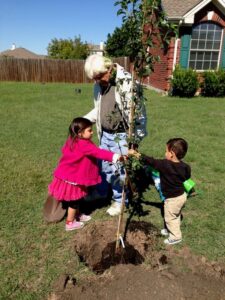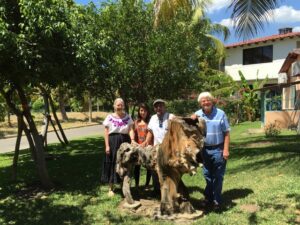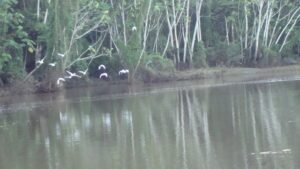
Tanenbaum Peacemaker in Action José “Chencho” Alas, El Salvador
The UN General Assembly declared November 6 of each year the International Day for Preventing the Exploitation of the Environment in War and Armed Conflict.
Several of Tanenbaum’s 28 Peacemakers in Action work, or have worked, within their countries’ conflict zones to protect the environment.
To honor Nov. 6, we share reflections from Tanenbaum Peacemaker in Action José “Chencho” Alas of El Salvador. He describes his faith-filled relationship to the environment and how he joined interfaith forces to restore El Salvador’s environment in the wake of the destructive civil war.:
MOTHER EARTH, OUR COMMON HOME
A powerful verse from Gen. 2:15 has always impressed me and inspired my work:
“Yahweh God took the man and settled him in the garden of Eden to cultivate and take care of it”.
This is the first commandment that we received, to take care of the environment in order to harvest the fruits of Mother Earth.
On May 24, 2015, Pope Francis promulgated his most important encyclical titled Laudato Si dedicated to the environment, just days before the UN Climate Change Conference in Paris.

Chencho (far right) in El Salvador
In the second paragraph the Pope wrote to us:
“This sister now cries out to us because of the harm we have inflicted on her by our irresponsible use and abuse of the goods with which God has endowed her… The violence present in our hearts, wounded by sin, is also reflected in the symptoms of sickness evident in the soil, in the water, in the air and in all forms of life.”
On June 12, 1992, Fidel Castro, President of Cuba at the time, stated at the UN:
“An important biological species is at risk of disappearing due to the rapid and progressive liquidation of its natural living conditions: man. They have poisoned the seas and rivers, they have polluted the air, they have weakened and perforated the ozone layer, and they have saturated the atmosphere of gases that alter the climatic conditions with catastrophic effects that we are already beginning to suffer.”
After 15 years of living in exile, from 1977-1992, I returned to my country, El Salvador, with a heart full of joy to contribute to the recovery of my land that had been devastated by war from 1980-1992. As a result of the war, I found that my country had plunged into greater poverty. Hundreds of thousands of people were forced to emigrate from their places of origin, either internally or externally, to neighboring countries, the United States, Canada, or Europe.
I returned to Suchitoto, my last parish, and it was very hard for me to witness that 70% of the population of the countryside and the city had emigrated. The people who lived in Suchitoto were no longer the same, they were new, and the majestic hill of Guazapa looked bare of vegetation, it had been sprayed with white phosphorus imported from the United States and Israel. The hill served as a stronghold for the guerrillas during the war.
I asked Mario López, former guerrilla commander, what my contribution could be to the reconstruction of the human network. Mario requested that I collaborate in the Lower Lempa River where 47 rural communities had been established. I received financial support from the Kellogg Foundation. They donated $300,000. The contribution served to organize families in groups of 7 to 10 for food production, introducing organic farming. The families understood the importance of being organized.
We founded the Coordinating Committee of the Communities of Bajo Lempa and together we created a peace program. This was the beginning of the Local Peace Zone following the UNESCO model. I facilitated a total of 36 peace workshops and we obtained the participation of 114 communities. The crime was lowered to zero and in 1998 we declared the region a zone of peace after having been one of the most violent in the country.

Mangrove trees along the coast of Jiquilisco Bay
Very soon we discovered that the area needed a reforestation program, especially the coast of Jiquilisco Bay. We began receiving delegations of Jewish university students sent by American Jewish World Service, based in New York, and with them we planted hundreds of thousands of mangrove candles* on the beaches. Mangrove, like coral, serves as a nest for shrimp and fish multiplication.
It is clear that wars only serve to destroy our Mother Earth and burden our populations with poverty.
The war industry only serves to enrich a very small number of wealthy people feeding on the blood of the poor. The only thing that can save us from violence is solidarity of the peoples, a universal recognition that we have been created in the likeness of God and that our dignity is above any material means.
*The mangrove produces seeds that are like candles. It doesn’t multiply by the roots. You plant the candles.